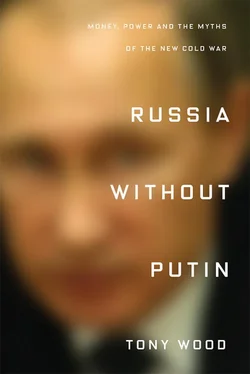The actual historical experience of interwar Europe, when the middle classes of several countries were among the most energetic supporters of fascism, was apparently neither here nor there.
The battles around the Gazprom building were brilliantly satirized in a Brechtian Songspiel titled ‘The Tower’ by the leftist art collective Chto delat ’, available online.
A large proportion of Vladivostok residents drive Japanese cars, which have the steering wheel on the right.
The name derived from the statue to a nineteenth-century Kazakh poet, Abai Kunanbaev (or Qunanbaiuli in Kazakh), next to which the camp originally sprang up.
These are a historic bane of Russian life. Gogol is popularly credited with a phrase that people still regularly trot out: the country’s two main problems are duraki i dorogi – fools and roads.
In Russian, the adjective russkii denotes Russian ethnicity, whereas rossiiskii is used to refer to citizens of the Russian Federation as a multiethnic whole.
The words of British Prime Minister John Major. According to declassified documents published in 2017, similar assurances were given to Gorbachev by US Secretary of State James Baker – using the now famous formula ‘not one inch eastward’ – as well as by German Chancellor Helmut Kohl and his Foreign Minister Hans-Dietrich Genscher, French President François Mitterrand, and NATO Secretary-General Manfred Woerner. See Svetlana Savranskaya and Tom Blanton, ‘NATO Expansion: What Gorbachev Heard’, National Security Archive Briefing Book , No. 613, 12 December 2017.
Russian nationalists were also almost certainly behind the 2009 killing in Moscow of lawyer Stanislav Markelov and journalist Anastasia Baburova, both antifascist activists. Markelov had argued against the early release of Colonel Yuri Budanov, who had been jailed in 2003 for torturing and killing a young Chechen woman; Budanov, who had become an icon for Russian nationalists, was himself shot and killed in 2011.
Ukraine had been invited to join, but it quickly became clear that the EU Association Agreement and the Russian-dominated ‘Eurasian’ project were mutually exclusive; this put the Ukrainian government in a quandary, setting the stage for Yanukovych’s U-turn and the Maidan protests in 2013.
Part of the reason for this is phenomenal corruption in military procurement, which makes Russian weapons systems among the most expensive on the planet.
The fact that so many of Russia’s wealthy park their money overseas rather than investing it in Russia itself not only fuels tremendous domestic inequalities, but also puts the country at a strategic disadvantage internationally.
‘“No Putin, No Russia,” Says Kremlin Deputy Chief of Staff’, Moscow Times , 23 October 2014.
The most comprehensive accounts of Putin’s background and career are Steven Lee Myers, The New Tsar: The Rise and Reign of Vladimir Putin , New York 2015, and Fiona Hill and Clifford Gaddy, Mr Putin: Operative in the Kremlin [revised and expanded edition], Washington, DC 2015. Other works I have drawn on here include Masha Gessen, The Man without a Face: The Unlikely Rise of Vladimir Putin , London 2012; Anna Arutunyan, The Putin Mystique , London 2014; Angus Roxburgh, The Strongman: Vladimir Putin and the Struggle for Russia , London 2011; Allen Lynch, Vladimir Putin and Russian Statecraft , Washington, DC 2011; and Richard Sakwa, Putin: Russia’s Choice [second edition], London 2008.
Vladimir Putin et al., First Person: An Astonishingly Frank Self-Portrait by Russia’s President , London 2000.
Putin et al., First Person , pp. 69–70, 79.
Gleb Pavlovsky, ‘Putin’s World Outlook: Interview by Tom Parfitt’, New Left Review , 88, July–August 2014, p. 56.
Quoted in Hill and Gaddy, Mr Putin , p. 149.
Gessen, Man without a Face , p. 120; Myers, New Tsar , pp. 78–79.
The fullest account is in Gessen, Man without a Face , ch. 5.
Hill and Gaddy, Mr Putin , p. 159; Myers, New Tsar , pp. 80–81. It seems plausible that Warnig and Putin met in Dresden in the 1980s – as Myers points out, there are group photographs from the time in which they both appear – but the two men deny it.
The Russian sociologist Alena Ledeneva has written the indispensable books on this theme: Russia’s Economy of Favours , Cambridge 1998; How Russia Really Works , Ithaca, NY 2006; and Can Russia Modernise? , Cambridge 2013.
Myers, New Tsar , p. 126.
Historical prices from the US Department of Energy’s Energy Information Administration.
Figures from Rosstat, World Bank and Vladimir Popov, ‘Russia Redux?’, New Left Review 44, March–April 2007.
Gryzlov’s aphorism has become proverbial in a slightly different form – ‘Parliament is no place for discussions.’ For his original wording, see ‘Boris Gryzlov izbran spikerom Gosdumy chetvertogo sozyva’, Leningradskaia pravda , 29 December 2003.
Daniel Mitchell, ‘Russia’s Flat Tax Miracle’, Heritage Foundation website, 24 March 2003; Thomas Friedman, ‘Russia’s Last Line’, New York Times , 23 December 2001.
The best picture of the post-Soviet oil industry is Thane Gustafson, Wheel of Fortune: The Battle for Oil and Power in Russia , Cambridge, MA 2012.
Myers, New Tsar , pp. 114–15. The thesis and the 1999 article are lucidly analysed by Harley Balzer in ‘The Putin Thesis and Russian Energy Policy’, Post-Soviet Affairs , vol. 21, no. 3, 2005, pp. 210–25.
See Andrew Barnes, Owning Russia: The Struggle over Factories, Farms, and Power , Ithaca, NY 2006, p. 218.
Gerald Easter, ‘Revenue Imperatives: State over Market in Post-Communist Russia’, in Neil Robinson, ed., The Political Economy of Russia , Lanham, MD 2012, p. 62.
Steven Levitsky and Lucan Way, ‘The Rise of Competitive Authoritarianism’, Journal of Democracy , vol. 13, no. 2, 2002; Andrew Wilson, Virtual Politics New Haven 2005; Olga Kryshtanovskaia and Stephen White, ‘Putin’s Militocracy’, Post-Soviet Affairs , vol. 19, no. 4, 2003.
Luke Harding, Mafia State , London 2011; Karen Dawisha, Putin’s Kleptocracy , New York 2014.
An English-language condensation of Furman’s arguments can be found in ‘Imitation Democracies’, New Left Review 54, November–December 2008, pp. 28–47. Furman was Russia’s leading comparative scholar on post-Soviet politics; for a comprehensive account of his life and work, see Perry Anderson, ‘One Exceptional Figure Stood Out’, and ‘Imitation Democracy’, London Review of Books , 30 July 2015 and 27 August 2015.
Читать дальше












